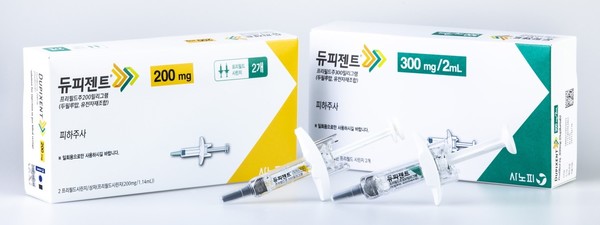Dupixent (dupilumab), the first approved biological drug for treating atopic dermatitis, has not just improved symptoms in oral corticosteroid-dependent asthma patients but demonstrated the effect of reducing steroid use.
Sanofi said so, releasing its three-year, long-term data on severe asthma patients.
In addition, Dupixent also cut down on medical expenses caused by asthma by reducing the hospitalization rate and visits to emergency rooms based on real-world evidence (RWE) data at 7,700 U.S. medical institutions, according to the French pharmaceutical company.
Sanofi released these and other clinical data at the European Respiratory Society’s annual conference (ERS 2022) from Sept. 4-6, including those which demonstrated the effect of Dupixent on improving asthma symptoms and reducing oral corticosteroid use in severe asthma patients.
At the conference, Sanofi unveiled many data and RWE data together that confirmed the improvement of asthma symptoms associated with type 2 inflammatory biomarkers, solidifying the treatment effect and safety profile in type 2 severe inflammatory asthma.

Besides, Dupixent reduced the aggravating frequency of severe asthma and lowered its severity, consequently demonstrating it is a treatment that helps to attain the treatment goal of severe asthma.
Notably, the postmortem analysis study of VENTURE/TRAVERSE clinical trials suggested once again that Dupixent could become a treatment solution for severe asthma patients, including those who rely on steroids.
According to the data made public, Dupixent, while reducing steroid use for three years, improved major symptoms of asthma, such as severity deterioration and weakening of lung function, annually.
The postmortem analysis study was conducted on steroid-dependent asthma patients who participated in the VENTURE study, the existing global phase 3 clinical trials.
In the VENTURE study, patients who had been administered with Dupixent 300mg or placebo with an interval of two weeks, got additional administration of Dupixent for a maximum of 96 weeks through the TRAVERSE study. The patients involved were also classified and analyzed into two groups -- those who use more than 10 mg of steroid daily and those who use less than 10 mg of the steroid.
Regardless of the amount of steroid use, Dupixent reduced the annual asthma severity aggravation rate in the 96th week compared to the end of the preceding VENTURE study.
In the placebo group among patients who used more than 10 mg of steroid daily, the annual severe asthma aggravation rate showed improvement of 81 percent or more at the 96th week, and the existing Dupixent-administered group also showed an improvement rate of 43 percent or higher. In the patient group who used less than 10 mg of steroids, the improvement rates were higher than 80 percent and 36 percent, respectively.
Moreover, regardless of Dupixent/placebo administration or the amount of steroid use, Dupixent reduced steroid use by 70 percent or more in the 96th week of administration compared to the baseline of the VENTURE study.
When researchers divided the Dupixent-administered group into those who used more than 10 mg of steroid daily and those who used less than 10 mg, it reduced their steroid use by 83 percent and 89 percent, respectively. It means Dupixent could be a companion therapy that reduces concerns caused by the long-term use of steroids for steroid-dependent patients.
The data released at the conference included the U.S. RWE data, which analyzed moderate-to-severe asthma patients administered with Dupixent.
According to the data, Dupixent reduced the ER visits related to asthma by up to 73.4 percent and reduced the hospitalization rate by a maximum of 66.7 percent. Besides, it also reduced the visits to the internal medicine department, helping to reduce asthma-related medical expenses.
Among severe asthma patients, those who depend on steroids still feel a lot of burdens as they are exposed to side effects caused by the long-term use of steroids, according to Park Hee-kyung in charge of the specialty care business division at Sanofi-Aventis Korea.
“The latest data on Dupixent is meaningful because they showed severe asthma patients, and steroid-dependent ones, in particular, can expect the long-term improvement of symptom while reducing their steroid reliance through Dupixent and reduce social and economic burdens as well.”
Related articles
- Sanofi releases longest data of Dupixent in atopic dermatitis
- Lilly aims to overcome atopic dermatitis with biological drug
- FDA approves JAK inhibitors as 2nd-line systemic therapy in atopic dermatitis
- Sanofi’s Dupixent targets chronic pruritus
- Pfizer’s JAK inhibitor enters Korean atopic dermatitis market

